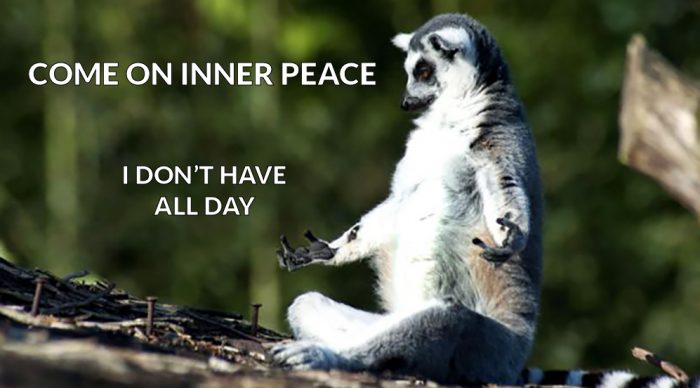Meditation My Ass!
It was 2017 and I was working with a fairly new client. Dutifully, I had assigned meditation as a practice for developing his leadership presence. That all familiar discussion arose. He knew meditation would support his cause but was finding it difficult to integrate meditation into his daily life. What quickly came onto the scene were visions of my own struggle with meditation. I felt nothing but empathy for him.
Ten years earlier I was participating in one-year coaching certification. My coach asked me to establish a daily practice of ‘sitting.’ Meditation My Ass! That was pretty much my response. There was no way I was going to simply sit—for twenty long minutes every day, to meditate. No way, and no how. Would not happen—and it didn’t.
I grew up in the 70’s and my parents were heavily involved in the self-help revolution. I was “gifted” personal development seminars for most birthdays and graduations from the age of 12 to 18. My brain was wired to believe and live concepts like “Win-Win”, “I am responsible vs. I am victim” and “To think is to create.”
These beliefs were so engrained in me, I’m not sure, at least back then, I saw another way to live my life. So when I decided to study Organizational Psychology and later become a certified coach, no one, including myself, were surprised. I had this. At least I thought I did.
Meditation has been painstakingly hard for me.
Even having done a lot personal work and later studying human development, when the practice of “sitting” was requested of me, I knew immediately it wasn’t going to happen. It actually sounded like torture. In fact, even if I wanted to I wasn’t confident I could. I didn’t get the point. How could I and more importantly, why would I, simply be still?
I was used to moving and moving quickly. I was taught to constantly reach for more, to set bigger goals, to become a better version of myself. When I stopped moving I felt physically anxious. Like life was passing by or I was missing out on something vital. Taking action was my oxygen.
There was also this consistent and insistent voice that told me to keep reaching. That somewhere out there I would finally find that one thing that would satiate my demand for more. That would make me feel enough. The self-help seminars taught me this too.
And so, it felt absolutely necessary, and normal, to keep moving.
Yet…while I wrestled with my own resistance, I deeply envied people who meditated regularly. They seemed to possess a calm presence and discernment of how and where to spend their time and energy. Discernment I did not have.
Now I know, I just wasn’t ready.
I wasn’t ready to be still. I couldn’t and wouldn’t give myself permission to just sit. To do nothing but focus on my breath and drop into a deeper relationship with my inner-self seemed counter-productive. As much as I said I wanted to slow down, I didn’t really want to. I was afraid of what I would find. I was afraid of what I would feel. I was afraid of what would arise.
So my search for stillness continued.
I spent the next several years tiptoeing around the concept of stillness. I started to practice yoga; which was a start. I came to hunger for that last fifteen minutes of class when the heat fans stopped sucking the air out of the room and I melted into savasana while some song floated through the air that felt like it was selected just for me. At that moment, I could be still. Was that a form of meditation? I wondered. I hoped.
And then another barrier emerged.
Not long after I considered myself a regular “meditator” I stumbled into another barrier—my need to be good at things. My quest for perfection.
It was 2015 and I was in a coaching session with one of my clients. He made a comment that caught my attention. He said “I’m doing meditation almost every day but I still suck at it.”
It got me thinking—do most of us who meditate expect mastery, to actually be “good” at it? Or do we do it for the benefit—because it is good for us, not because it is something else to conquer?
More importantly, did I believe, even today after my own thirteen-year journey, that meditation was about mastery as opposed to benefit? What did I do with that little voice in my head that was saying, “If you get this right, you’ll finally be one of those people you envied for so many years?” That voice that felt at odds with meditation’s promise of a quieter mind and true self-acceptance.
Why don’t you meditate?
Even now, with all the data stacked in its favor, why is meditation as a regular practice so challenging for many of us to incorporate into our lives? It was challenging for me and is genuinely challenging for most of my clients.
There are dozens of reasons that get in our way but my reasons were clear. I wasn’t ready to be still. And I wasn’t ready to allow myself not to be perfect. To not be good at it. These were the lessons meditation was meant to teach me, and they have changed everything.
Without judgment, what are your reasons?
If you have always wanted to meditate but can’t seem to adopt it as a regular practice, why?
And what if?
These reasons keep you from feeling the whole of your life?
These reasons keep you from coming into deeper contact—with yourself and therefore the world around you?
These reasons keep you from being with, letting in and letting go—even the dark and ugly stuff you wish didn’t stop by for a visit?
Or what if these reasons simply kept you from feeling more peace, more patient, more focused?
Would you still resist?







Read 0 comments and reply